
A health worker conducts COVID-19 Rapid Antigen Test. File photo:Xinhua
Three days after Chinese authorities allowed antigen self-test kits for public use as a dynamic adjustment of the epidemic prevention measures amid the biggest infection surge in two years, many online sales platforms witnessed a rapid increase in pre-orders of related products.
Some communities and schools in East China organized residents and students to conduct antigen tests, and the worst-hit Jilin Province announced the purchase of 12 million antigen testing kits for its residents.
Chinese health experts said that the fast spread of Omicron has prompted China to adjust its COVID-19 response to be more targeted and scientific, which includes the nationwide promotion of antigen self-test kits, and it may also see more residents quarantined at home instead of designated hotels.
From Saturday to Monday, China approved 11 COVID-19 antigen test kits made by local companies, including Beijing Savant Biotechnology, Nanjing Vazyme Biotech, Guangzhou Wondfo Biotech, Beijing Jinwofu Bioengineering Technology and Shenzhen-based BGI PathoGenesis Pharmaceutical Technology.
Jilin Province, worst-hit in this nationwide surge, announced on Monday that it had acquired 12 million antigen testing kits and 36,000 of them had been sent to Jilin University on Sunday.
On Monday, several COVID-19 antigen detection products were on pre-sale at major online platforms including JD.com and Taobao. More than 5,500 customers had pre-ordered the rapid antigen testing kits made by Beijing Jinwofu Bioengineering Technology Co on Chinese delivery giant Meituan as of press time, with actual sales to start 15 days later.
In Shanghai, several drug stores said that they had contacted manufacturers of the antigen tests, and the testing products would be available as early as next week. Two Beijing drug stores said that residents will have to wait for half a month to purchase the products.
While antigen test kits in many cities have not yet reached residents, some communities in Hangzhou, East China's Zhejiang Province and Changzhou, East China's Jiangsu Province, have started distributing antigen test kits to residents.
A resident surnamed Shen who lives in Yuhang district in Hangzhou told the Global Times on Monday that the property management company of her community distributed free antigen testing kits to residents on Sunday night, and later she sent a photo of her negative result to the WeChat group established by her property management company.
A college student at Hangzhou Normal University surnamed Chen confirmed to the Global Times that their university has given students antigen test kits, and they have submitted their results to the university. But they were not informed of what would happen if the tests turn positive.
Liyang in Changzhou organized city-wide antigen tests for all residents starting from Monday. The government said in a notice that residents will get the kits at designated places after presenting their ID and nucleic acid testing QR code. Those who refused to take the antigen tests will face legal accountability, the notice said.
To boost the early discovery of COVID-19 cases, China's National Health Commission added antigen detection as an option for COVID-19 testing on Friday, although nucleic acid test results are still decisive for diagnosis.
People who test positive with COVID-19 antigen kits should immediately contact local authorities regardless of whether or not they have symptoms, it said.
In Hong Kong, which has rolled out antigen testing, residents have to submit their results to a specialized online platform.
Jin Dongyan, a biomedical professor at the University of Hong Kong, told the Global Times on Monday that the Chinese mainland should develop a system in the Health Kit, or Jiankang Bao, so that people's results of antigen tests could be displayed like their nucleic acid test results and vaccination information.
He said those who submit fake results deliberately should face legal accountability and Chinese authorities have to supervise self-test manufacturers to ensure the quality of the products.
China is adjusting its dynamic COVID-19 strategy according to the features of the variants, and the fast spread of Omicron may bring more changes in China's response, Jin said.
Shanghai-based renowned infectious disease expert Zhang Wenhong said early Monday on Weibo that at-home testing kits should be included in a more comprehensive, intelligent and sustainable COVID-19 strategy.
With the nationwide promotion of self-test kits, it's likely that many people with mild symptoms or no symptoms, and their close contacts, could be quarantined at home instead of at designated hotels, Jin said, noting it could also prevent cross-infection and save resources.
Those who have children or elderly people at home could still be quarantined at designated places or hospitals, Jin said.
Amid the fast spread of Omicron, China may also adjust its mixed nucleic acid testing policy, in which five or 10 samples are mixed in one group for speed testing.
The surge of cases indicates that a large number of mixed tests will turn positive, thus many people who are in the positive group -- whether infected or not -- have to be retested, Jin said.




